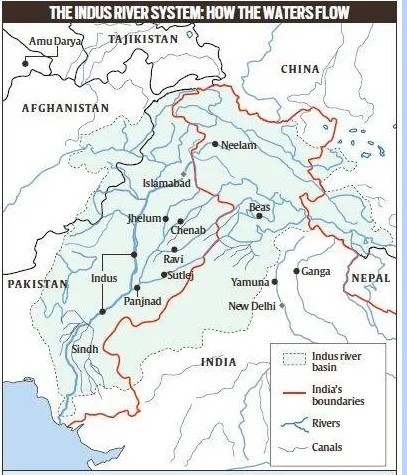Syllabus: GS2/IR
Context
- India has sent a formal notice to Pakistan, seeking the “review and modification” of the Indus Water treaty (IWT).
About
- The latest notice is issued under Article XII (3) of the IWT, signaling India’s intent to revoke and renegotiate the 64-year-old treaty.
- Article XII (3) states: “The provisions of this Treaty may from time to time be modified by a duly ratified treaty concluded for that purpose between the two Governments”.
- The two notifications come amidst a prolonged controversy over the construction of two hydel power projects by India in Jammu & Kashmir — one on Kishanganga, a tributary of Jhelum, in Bandipora district, and the other (Ratle Hydroelectric Project) onChenab in Kishtwar district.
- Both are “run-of-the-river” projects, meaning they generate electricity (330 MW and 850 MW respectively) using the natural flow of the river, and without obstructing its course.
- However, Pakistan has repeatedly alleged that both these projects violate the IWT.
The Indus Water Treaty
- The Indus Water Treaty was signed in 1960 between India and Pakistan after nine years of negotiations arranged by the World Bank.

- It governs the management and use of the Indus River system.
- Water Allocation: The treaty allocates the waters of the three eastern rivers (Beas, Ravi, and Sutlej) to India and the three western rivers (Indus, Chenab, and Jhelum) to Pakistan.
- The treaty gave India about 30% of the water carried out by the Indus Rivers Systemn while Pakistan got 70% of the waters.
- Permanent Indus Commission: The treaty established a commission to facilitate communication and cooperation between the two countries regarding water management.
- Dispute Resolution: Provisions are included for addressing disputes, primarily through consultation and negotiation.
- According to the treaty, there is a sequential, three-level mechanism where disputes are first decided at the level of the Indus Commissioners of the two countries, then escalated to the Neutral Expert who is appointed by the World Bank, and only then escalated to the Hague-based Permanent Court of Arbitration (PCA).
- Development Projects: India is allowed to develop hydroelectric projects on the western rivers, provided they do not affect Pakistan’s water supply.
Concerns for India
- There is a significantly altered population demographics, coupled with connected agricultural and other uses of the waters.
- There is a need to accelerate the development of clean energy to meet India’s emission targets.
- It is the impact of persistent cross-border terrorism in Jammu and Kashmir which has impeded the smooth operations of the Treaty and undermined full utilization of India’s rights.
- The Indian Government has also asserted that the dispute resolution mechanism of the Treaty requires reconsideration.
Way Forward
- The Indus Waters Treaty is considered one of the most successful water-sharing endeavours in the world today.
- However, there is a need to update certain technical specifications and expand the scope of the agreement to address climate change.
Source: TH
Previous article
Pradhan Mantri Janjatiya Unnat Gram Abhiyan (PMJUGA)
Next article
Bio-RIDE Scheme to Support R&D in Biotechnology